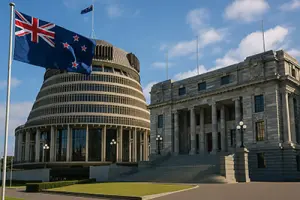
In a landmark move on 15 July 2025, New Zealand’s Parliament advanced the Online Casino Gambling Bill with a decisive 83–39 vote in its first reading. Introduced by Internal Affairs Minister Brooke van Velden, the bill aims to regulate online casino operations and protect local players from risks associated with unlicensed offshore platforms.
Minister van Velden emphasized the need for change: “Currently, New Zealanders can legally access thousands of offshore gambling websites. But the market is unregulated, so there are no player safety standards or oversight of harm minimisation,” she stated. “My intention with this Bill is to ensure that online gambling is safer for New Zealanders who wish to gamble online to do so. In addition, that companies providing this service contribute to tax revenue and funding the services that treat gambling harm in New Zealand.”
The proposed framework allows for up to 15 online casino licenses, each issued for an initial three-year term—renewable up to five years—through a competitive auction process. Licenses will be awarded only to operators who meet stringent requirements, such as implementing harm-prevention strategies, age-verification systems, and detailed transparency regarding compliance history. Non-compliance may result in fines of up to NZD 5 million (approx. USD 3 million).
Beyond licensing, the legislation also mandates contributions from licensed operators: a 1.24 percent profit levy directed to responsible gambling initiatives, along with standard goods and services tax and a 12% offshore gambling duty. Advertising will be allowed but controlled, with strict rules to prevent targeting underage users.
Supporters from across the political spectrum endorsed the bill. National MP Dan Bidois noted that New Zealanders are already frequenting unregulated sites and welcomed the measures: “This is why we've got a bill before us that regulates the sector and actually reduces the harm. I think this is a good thing. We can get tax from it. It is a formal sector.” Green Party members broke ranks with other opposition parties, stating that the harm reduction provisions aligned with their values . On the other hand, Labour MP Lemauga Lydia Sosene cautioned that the bill, in its current form, might not go far enough to protect vulnerable players: “the bill in its current form does not address those particular actions wholeheartedly. They are listed vaguely.”
The bill now heads to the select committee, where public consultation will open and stakeholders—including current offshore operators—are expected to provide input. Trina Lowry, Programme Director for the Online Gambling Implementation, urged early engagement from operators interested in the licences: “As we continue to design and implement the system, we want to ensure it is clear, efficient and supportive… to understand their experience and needs.”
Industry insiders anticipate a full licence auction by 2026, with licensed iGaming services potentially launching as early as mid‑2026. The Government has already laid groundwork for broader gambling reform by strengthening regulations to close offshore loopholes for online sports betting—which now exclusively falls under TAB NZ—following amendments to the Racing Industry Act.
What This Means for New Zealand
This reform marks a significant pivot in New Zealand’s gambling policy. Rather than ignoring a thriving grey-market that has dominated online gambling, the country is now steering towards formalization—with the dual goals of player safety and economic benefit. Funding for gambling harm services—such as the recent NZD 81 million initiative under the Strategy to Prevent and Minimise Gambling Harm—will likely receive further support from licensing revenues.
If fully enacted, this legislation could redefine New Zealand’s gaming landscape, bring billions in tax and duty into the public coffers, and provide regulated pathways for both domestic and international operators keen to serve Kiwi players.

 Content Writer: Janice Chew • Wednesday, 25/07/2025 - 23:30:50 - PM
Content Writer: Janice Chew • Wednesday, 25/07/2025 - 23:30:50 - PM